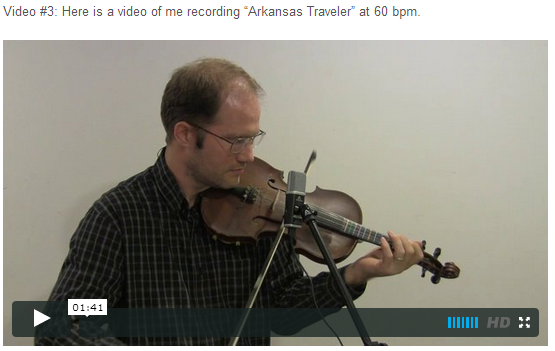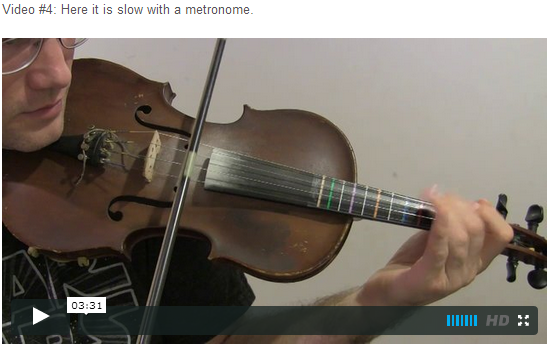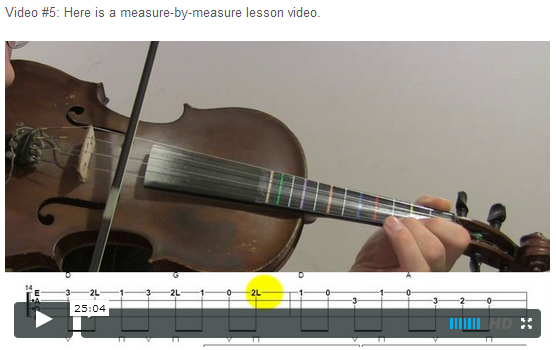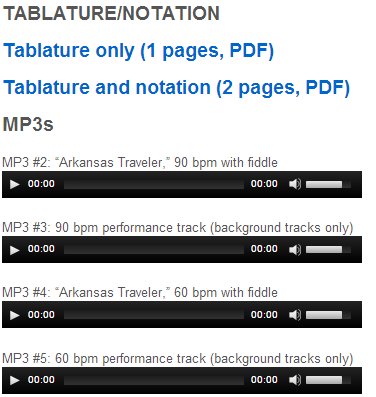Arkansas Traveler
This is an online fiddle lesson for the tune "Arkansas Traveler." BluegrassDaddy.com is your best source for Bluegrass, Old Time, Celtic, Gospel, and Country fiddle lessons!
Genre: Old Time, Bluegrass
Skill Level: Intermediate
Key of D
You may download and use any of the MP3s and tablature for your personal use. However, please do not make them available online or otherwise distribute them.
NOTE: If multiple videos and MP3s are loading at once, this page will get slow! I recommend that you refresh the page each time you open a new video or MP3.
MP3 #1: Listen to a famous version of "Arkansas Traveler" with dialogue by Len Spencer, Edison Records, 1902.
Video #1: This is a video of me, myself, and my daughters covering Len Spencer's famous 1902 dialogue of Col. Sanford Faulkner's Arkansas Traveler. Enjoy!
Video #2: Here is a video of me performing the fiddle tune "Arkansas Traveler" at 90 bpm.
from Encyclopedia of Arkansas:Origins
The Arkansas-based version of the Traveler is said to have begun in 1840. Colonel Sanford Faulkner got lost in rural Arkansas and asked for directions at a humble log home. Faulkner, a natural performer, turned the experience into an entertaining presentation for friends and acquaintances in which the Traveler was greeted by the Squatter at the log cabin with humorously evasive responses to his questions. Finally, the Traveler offered to play the second half, or “turn,” of the tune the Squatter was playing on his fiddle. The tune was the “Arkansas Traveler.” In his happiness at hearing the turn of the tune, the Squatter mustered all of the hospitality of his household for the benefit of the Traveler. When the Traveler again asked directions, the Squatter offered them but suggested that the Traveler would be lucky to make it back to the cottage “whar you kin cum and play on thara’r tune as long as you please.” At approximately the same time Faulkner began performing the “Traveler,” a similar performance of the “Arkansas Traveler” tune and a related dialogue emerged outside the state. One cannot tell with certainty which version came first. According to Thomas Wilson, writing in Ohio History in 1900, customers were attracted to the Golden Fleece Tavern in Salem, Ohio, by performances of the “Traveller” before 1852. While the Arkansas-based version of the dialogue portrayed tensions based upon differences among people from Arkansas—such as urban versus rural or wealthy versus poor—most versions told the story from the Traveler-as-outsider perspective, taking an uncomplimentary view of the state. Mose Case, an albino African-American entertainer from Buffalo, New York, performed the Traveler and his version ended by declaring that the Traveler “has never had the courage to visit Arkansas since!” The Case version was published in 1863 and distributed widely.
The Tune
The sheet music to the tune was first published in Cincinnati, Ohio, in 1847 as “The Arkansas Traveller and Rackinsac Waltz,” arranged by William Cumming. No one was credited with the composition. If not from the folk tradition, the tune was most likely written by Jose Tosso, a classical violinist and composer who lived in Cincinnati and was locally famous for his version of the “Arkansaw Traveler.” Several others, including Faulkner and Case, have also been credited with its composition. Over the years, the “Arkansas Traveler” has become one of the most recorded tunes in American history.
From arkansas-traveler.org:
- For thirty years Kit The Arkansas Traveller was one of the most popular plays in America. Opening in Buffalo on April 20, 1869, the play debuted to great acclaim in New York City in 1871. Frank Chanfrau and, later, his son Henry, owned the production and starred as Kit Redding, touring until 1899. So popular was the play that it maintained an annual engagement in Boston from 1872 to 1889.
- "The Arkansas Traveler” appeared in early recordings, both cylinder and disk, in the form of a humorous dialog. In 1902 the Len Spencer dialog version became the first song to sell one million records, according to one source. Then the tune itself became the first (or at least one of the first) "country music” songs ever to be recorded, by Eck Robertson and Henry Gilliland in June, 1922. This was among the first fifty recordings selected for the National Recording Registry, founded to preserve significant sound recordings in the United States. The Traveler has been recorded hundreds of times, in traditional, jazz and even symphonic arrangement, proving to be one of the most popular tunes in American history. Len Spencer (Feb 12, 1867 – Dec 15, 1914) was an elocutionist and recording artist whose performed speeches, skits, and songs. His most successful recording was the Arkansas Traveler, the most popular recording in America in 1902. Charles D’Almaine played the fiddle on the recording. Dialogue of the Arkansas Traveler by Len Spencer, Edison Records [1902].
Traveler – Why how do you do, boss? What might your name be? Squatter (playing the verse of the Arkansas Traveler throughout the performance) – Hey, what made you think I was boss here? T – Well, I just guessed it. S – Well, guess what my name is. Haw, haw. T – Well, how far is it to the next crossroads? S – Well, you just follow your nose and you’ll come to it. Haw, haw. T – Where does this road go to? S – Why it don’t go anywhere. It says right where it is. Haw, haw. T – Down the road I saw a horse with a broken leg. Now why don’t you kill it. People generally kill a horse with a broken leg. S – Round here we generally kill a horse with a shotgun. Haw, haw. T – you’re a pretty smart fellow, ain’t ya? S – I ain’t half as smart as my brother Bill. T – Who is your brother Bill? S – Why my mother’s son, of course. Haw, haw. T – Say, I noticed a hole I the roof of your house. Why don’t you get it fixed? S – Because it’s been raining lately. T – Why don’t you get it fixed when it’s not raining? S – When it don’t rain, it don’t leak. Haw, haw. T – For pity’s sake, play the rest of that tune, will you? S – Now look here. I just reckon there’s no man living smart enough to do that. T – Yes there is. I think I can if you let me…Ah, thank you. (Plays the chorus of the Arkansas Traveler.) S – Well, by chowder stranger, you’re the smartest man alive, you be. Come right in. Come right in. You can have anything in my place. Come on in. Haw, haw.
Official version of lyrics to Arkansas Traveler (composed by the Arkansas State Song Selection Committee in 1947)
On a lonely road quite long ago, A trav'ler trod with fiddle and a bow; While rambling thru the country rich and grand, He quickly sensed the magic and the beauty of the land. Chorus For the wonder state we'll sing a song, And lift our voices loud and long. For the wonder state we'll shout hurrah! And praise the opportunities we find in Arkansas. Many years have passed, the trav'lers gay, Repeat the tune along the highway; And every voice that sings the glad refrain Re-echoes from the mountains to the fields of growing grain. Chorus
The Turn of the Tune, is Arkansas artist E. P. Washburn’s companion piece to his more famous Arkansas Traveler painting, both of which he painted before 1859. By 1870, both paintings would be immortalized in lithographic print form by Currier & Ives, in New York City. The print features the traveler playing "The Turn of the Tune" on his fiddle for the squatter and his family. Below the print is text that recalls the conversation between the traveler (thought to be Arkansan Sanford Faulkner) and the squatter. (historicarkanasas.org)
Here are the children's lyrics put to the tune of Arkansas Traveler:
I'm Bringin' Home a Baby Bumblebee I'm bringin' home a baby bumblebee Won't my mommy be so proud of me I'm bringin' home a baby bumblebee—Ow! It stung me! I'm squishin' up my baby bumblebee Won't my mommy be so proud of me I'm squishin' up my baby bumblebee-Yuck! It's dirty! I'm lickin' up my baby bumble bee Won't my mommy be so proud of me I'm lickin' up my baby bumble bee-Ick! I feel sick! I'm throwin' up my baby bumble bee Won't my mommy be so proud of me I'm throwin' up my baby bumble bee-Oh! What a mess! I'm wipin' up my baby bumble bee Won't my mommy be so proud of me I'm wipin' up my baby bumble bee-Oops! Mommy's new towel! I'm wringin' out my baby bumble bee Won't my mommy be so proud of me I'm wringin' out my baby bumble bee-Bye-bye baby bumblebee!




